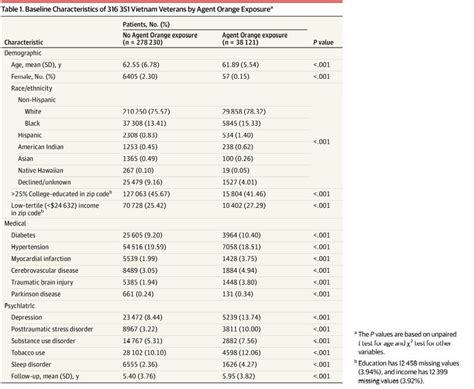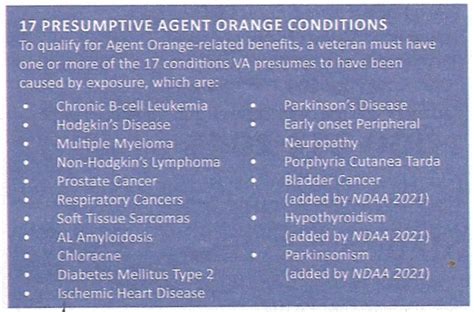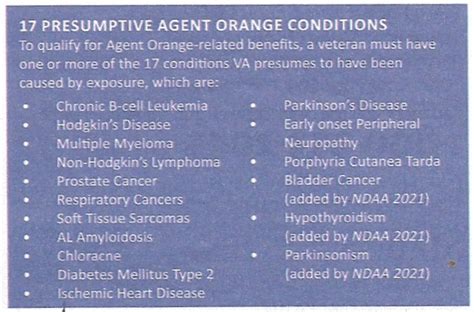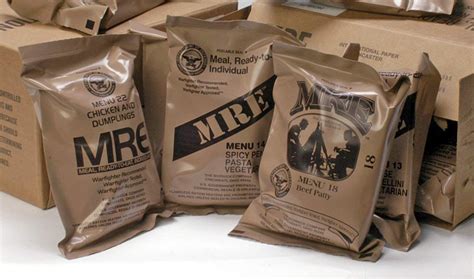Agent Orange Presumed Conditions List

Introduction to Agent Orange and Its Effects

The use of Agent Orange during the Vietnam War has had long-lasting effects on the health of veterans and their families. Agent Orange was a herbicide and defoliant used by the United States military to destroy crops and foliage that provided cover for enemy forces. However, it contained the highly toxic dioxin, which has been linked to various serious health conditions. The U.S. Department of Veterans Affairs (VA) has established a list of presumptive conditions associated with exposure to Agent Orange, making it easier for veterans to receive benefits and healthcare related to these conditions.
Understanding Presumptive Conditions

Presumptive conditions are diseases or disabilities that the VA assumes are related to military service, in this case, exposure to Agent Orange. Veterans who served in Vietnam or in other areas where Agent Orange was used and later developed one of these conditions may be eligible for disability compensation and other benefits. The list of presumptive conditions related to Agent Orange exposure has evolved over time as more research becomes available on the effects of dioxin.
List of Presumed Conditions

The following are some of the conditions that the VA presumes are associated with exposure to Agent Orange: - Chloracne: A skin condition that can occur soon after dioxin exposure. - Hodgkin’s Disease: A type of lymphoma that affects the immune system. - Multiple Myeloma: A cancer of plasma cells in the bone marrow. - Non-Hodgkin’s Lymphoma: A group of cancers that affect the immune system. - Porphyria Cutanea Tarda: A disorder characterized by blistering of the skin upon exposure to sunlight. - Prostate Cancer: One of the most common cancers among men. - Respiratory Cancers: Including lung cancer. - Soft Tissue Sarcomas: A group of cancers in soft tissues like fat, muscle, and blood vessels. - AL Amyloidosis: A condition characterized by the buildup of abnormal proteins in organs like the heart and kidneys. - Diabetes Mellitus Type 2: A common form of diabetes that affects how the body uses blood sugar. - Ischemic Heart Disease: A condition characterized by a reduced flow of blood to the heart, often leading to heart attacks. - Parkinson’s Disease: A neurological disorder that affects movement. - Peripheral Neuropathy, Early-Onset: Damage to the nerves that can cause pain, numbness, and weakness, typically in the hands and feet.
Exposure Locations and Eligibility

Veterans who served in the following locations are eligible for the presumptive conditions related to Agent Orange: - Vietnam between January 9, 1962, and May 7, 1975. - Along the demilitarized zone (DMZ) in Korea between April 1, 1968, and August 31, 1971. - Certain units that operated in Thailand during the Vietnam Era. - On Royal Thai Air Force bases in Thailand. - Veterans who were exposed to Agent Orange in other locations, including those who were involved in the testing, transportation, or storage of the chemical.
💡 Note: The list of presumptive conditions and locations of exposure can change as new evidence emerges, highlighting the importance for veterans to stay informed about their eligibility for benefits.
Applying for Benefits

Veterans who believe they have been exposed to Agent Orange and are suffering from one of the presumptive conditions should apply for benefits through the VA. The process involves submitting a claim with the necessary documentation, including military records and medical evidence of the condition. The VA will review the claim to determine eligibility for compensation, healthcare, and other benefits.
Importance of Healthcare and Support

For veterans affected by Agent Orange, accessing appropriate healthcare and support is crucial. The VA offers a range of services, from medical treatment to counseling and assistance with daily living activities. Additionally, many organizations provide support to veterans and their families, including help with navigating the benefits system, legal advice, and emotional support.
Future Research and Advocacy

Continued research into the effects of Agent Orange is essential for understanding the full scope of its impact on veterans’ health. Advocacy efforts by veterans’ organizations and supporters play a significant role in ensuring that those affected by Agent Orange receive the benefits and care they deserve. As more is learned about the effects of dioxin, there may be additions to the list of presumptive conditions, potentially benefiting more veterans and their families.
What is Agent Orange?

+
Agent Orange was a herbicide and defoliant used by the U.S. military during the Vietnam War, containing the toxic chemical dioxin.
How do I know if I was exposed to Agent Orange?

+
Veterans who served in Vietnam, along the DMZ in Korea, or in certain locations in Thailand during specific time periods may have been exposed. Check with the VA for eligibility based on your service history.
What benefits are available for veterans exposed to Agent Orange?

+
Eligible veterans may receive disability compensation, healthcare, and other benefits for themselves and their families, depending on the presumptive condition and level of disability.
In summary, the impact of Agent Orange on veterans’ health is a critical issue that continues to affect many lives. The list of presumptive conditions serves as a foundation for ensuring that those exposed receive the benefits and healthcare they need. As research continues and advocacy efforts persist, it is essential for veterans and their families to stay informed about their eligibility for benefits and the support services available to them.



